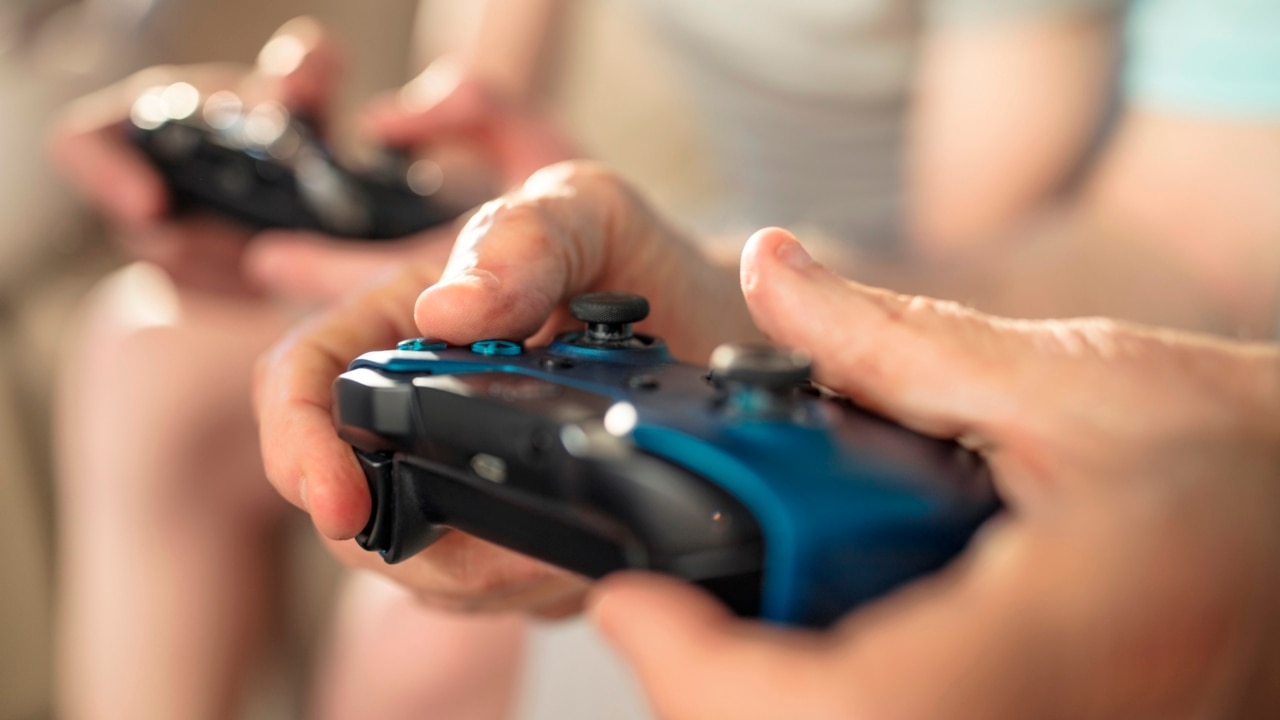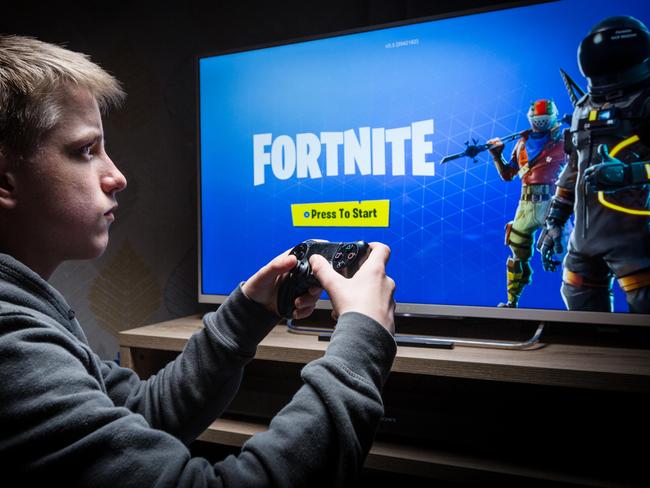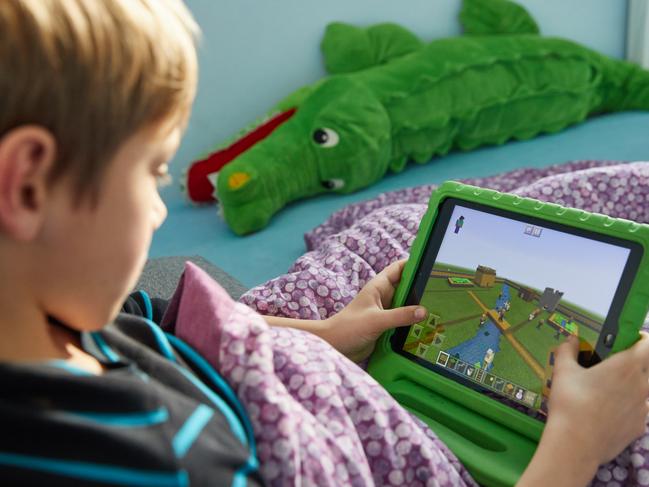Fortnite, Roblox: Tech-addicted kids need help as they give millions to game corporations
An Australian tutor has revealed the “devastation” of video game addiction, including the case of boy who refused to go to school for six years.

Technology
Don't miss out on the headlines from Technology. Followed categories will be added to My News.
A shocked tutor has lifted the lid on the “devastation’’ of gaming addiction, revealing he was hired to help a teenager who refused to attend school for six years.
Dave Retallick, a semi-retired teacher with 34 years’ classroom experience, has witnessed “fights and threats’’ over children’s online gaming, while tutoring up to 24 children per week in Adelaide over the past decade.
“The worst case was being employed to tutor an 18-year-old boy who had refused to go to school for the previous six years,’’ he said.
“His mother was a single parent with other children in the family.
“She was unable to control her son as he was bigger than her and had threatened violence if she tried to stop him gaming.
“I was employed to tutor him … to try and get his educational levels up to reasonable standard.
“But it was hard work as he was always tired.’’
Mr Retallick said the teenager gamed from 8pm to 8am every night of the week.
“His food had to be put outside his bedroom door and he always ate McDonald’s take away,’’ he said.
“No one was allowed to go into his bedroom, but his mother was allowed to clean the room every two or three weeks and would remove dozens and dozens of McDonalds boxes, wrappers and drink containers strewn all over his floor.’’
Mr Retallick said he had tutored at a home where a four-year-old boy was allowed to play violent R-rated games on a huge smart TV.
“The games involved chopping people’s heads off, machine gun and knife violence, with blood splattered everywhere,’’ he said.
“I tried to tutor a 12-year-old (sibling) while this was going on in the same room.’’
Mr Retallick called for action to ban the algorithms that make gaming so addictive to children.
“The arguments, the fights and the threats between parents and children are terrible to witness,’ he said.
“Action must be taken to stop these addictions as children’s lives are being ruined and their future social, family and work skills are being destroyed.’’
TECH-ADDICTED AUSSIE KIDS ‘TURN INTO VIOLENT CRIMINALS’
Teenagers are so hooked on gaming they are using stolen credit card details, dropping out of school or assaulting parents trying to switch off their technology.
As game corporations reap billions in profits, psychiatrists are demanding a ban on algorithms that make gaming as addictive as drugs or gambling.
And taxpayers are now footing a soaring bill for digital detox sessions, psychiatric counselling and obesity, all caused by excessive gaming.
Today, we launch a campaign calling for restrictions to children’s access to in-game gambling across all platforms.
“Kids are vulnerable and they’re being exploited by big tech,’’ said Sydney child psychiatrist Dr Philip Tam, who specialises in digital addictions.
“We’re potentially talking about a lost generation of young people who will not reach their social or economic potential.’’

Adelaide-based child psychiatrist Dr Huu Kim Le – himself a recovered gaming addict – warned many games are designed to “reward’’ players who log in every day.
“The gaming companies have got the science of addiction down to a fine art and it’s packaged as child’s play,’’ he said.
“We think it’s a harmless game with animated violence but there’s something more sinister embedded in the programming of games that the average person doesn’t know about.
“They’re all using the same tactics and feeding the same rewards to get a return on their investments through gaming.
“Some of their budgets are bigger than the budget to produce the Covid-19 vaccine.’’
Leading game companies saw their profits skyrocket over the past year, with Epic Games, the maker of Fortnite, reporting $US5.1 billion ($A6.59 billion) in revenue during 2020 despite earlier forecasts of $US3.6 billion ($A4.65 billion).
Roblox Corporation’s revenue soared by 81 per cent last year to $US924 million ($A1.195 billion), and Activision Blizzard’s revenue grew by 25 per cent to reach $US8.1 billion ($A10.47 billion).
Dr Le said gaming and social media could activate the same part of the brain as drug addiction.
“It used to be that children would steal money from their parents’ credit cards but now they can go on the Dark Web and find other people’s credit cards,’’ he said.

“They are showing no remorse – it’s free money and they are obviously desperate enough to do something criminal.
“Police have raided kids’ homes for credit card fraud in Australia.’’
Dr Le said angry children were assaulting parents who tried to turn off or limit the technology.
“It’s smashing of keyboards, punching walls, domestic violence, punching and pushing – parents are being held to ransom within their own homes,’’ he said.
Dr Le said more children were hooked on gaming after lockdowns in Victoria and NSW disrupted their usual routines of school and sport.
The problem has become so prevalent that Dr Le now offers telehealth consultations specialising in video game addictions, with Medicare rebates as high as $402 for an initial consultation costing $552 for metropolitan patients, or a $150 rebate for ongoing sessions costing $313.
Dr Tam said he felt “angry’’ that tech companies were deliberately making games and social media so hard to switch off.
“A lot of tech executives have kids themselves and they’re aware of the risks,’’ he said.
“It’s all having a big detrimental effect on education, social connectedness and sense of self.’’
Dr Tam said one teenager dropped out of school at 14 because he “games all night in online competitions on the other side of the world’’.
He said more children were suffering from anxiety and depression that had “skyrocketed’’ since the start of the Covid-19 pandemic.
“The young brain is simply not designed to cope with a huge bombardment of information all the time,’’ he said.
“I think there is a big rise in mental health problems because we are bombarding children with too much information, too much choice and too much pressure from a younger and younger age.
“I’m now prescribing antidepressants to kids in primary schools, which I wasn’t doing four or five years ago.’’
Dr Matthew Shaw, director of the young persons’ program at Ramsay Health Care’s Albert Road Clinic in Melbourne, has also seen an increasing number of teens needing help.
Medicare data shows that one in every eight teenagers aged 12 to 17, and one in 13 kids aged five to 11, attended subsidised counselling from a psychiatrist, psychologist or GP for mental health problems in 2019/20.
A federal Health Department spokesman said gaming addiction was not identified as a separate Medicare service item.
“It is therefore not possible to disaggregate Medicare mental health services data to identify which services were provided specifically for gaming addictions,’’ he said.
Dr Le said China had banned gaming after 10pm.
“In the Asian countries they’re a lot more authoritarian and they know (screen addiction) is a big problem that affects their economies,’’ he said.
“Australia has dropped the ball and not taken it seriously enough, and not offered enough intervention or regulation.’’
Dr Daniel Pellen, who chairs the youth mental health section of the Royal Australian and New Zealand College of Psychiatrists, called for more research into the impact online gaming.
He said 75 cent of mental illnesses begin before the age of 25, when the brain is still developing.
‘TEENS ADDICTED TO THEIR PHONES’
Teenagers are spending five hours a day on their phones, a startling new survey shows.
Half of Gen Zs admit they are addicted to social media, the survey of 1232 Australians aged 15 to 24, conducted by school-leaving service Year13, reveals.
Young women are more likely than men to feel addicted to social media.
Forty per cent of the young Australians surveyed felt that mobile phones should be kept in lockers during class.
The report’s author, Year13 founder Saxon Phipps, said one in three Gen Zs surveyed had been bullied or harassed online.
“With an average of five hours per day screen time, they’re spending a third of their waking lives on their phones,’’ he said.
Among teenagers, the survey found that 83 per cent use Instagram but just 29 per cent use Facebook.
Girls are more likely to use TikTok, while boys prefer YouTube.
Mr Phipps said Gen Zs loved having access to a world of information, and being able to communicate with “anyone, anywhere, at the press of a button’’.
“But having so much knowledge at their fingertips means they’re growing up faster and waking up earlier to the realities of the world,’’ he said.
“On top of this their level of connectivity opens the gates for online bullying, comparisons and FOMO (fear of missing out).’’



